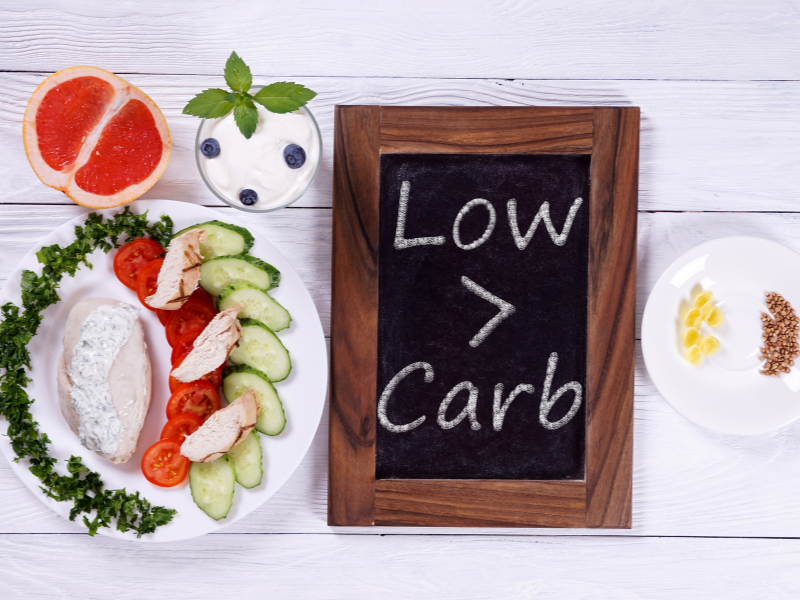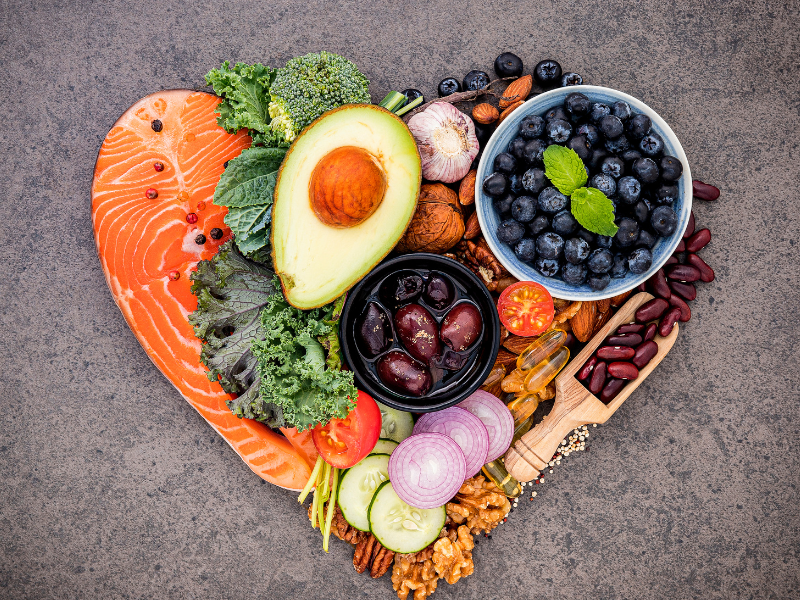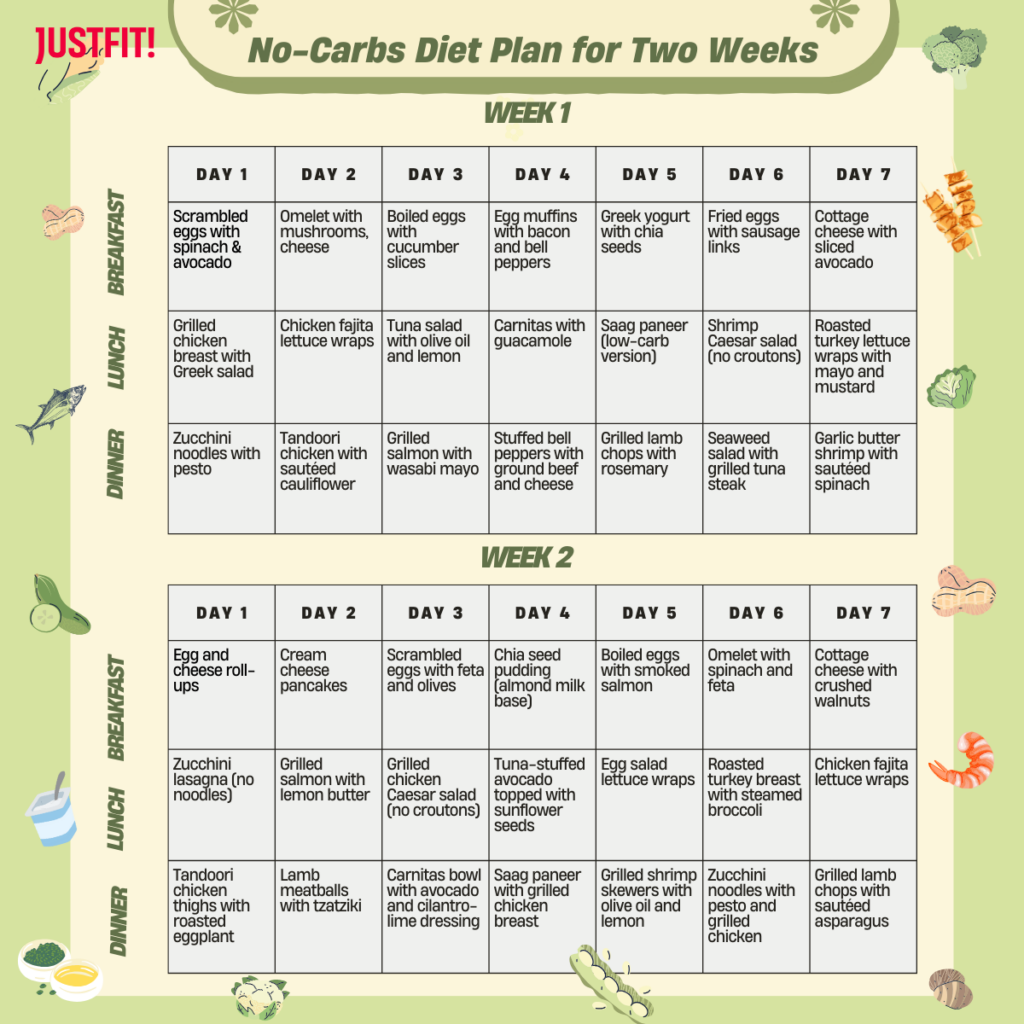


Ready to take the leap of faith and say goodbye to carbs and hello to a healthier you? We’ve got just the right meal plan to get you started on a low-carb diet. Whether you are looking to shed some pounds or boost your energy levels, this guide has got you covered with its no-carbs diet plan for 2 weeks and a free PDF of it!. So read on to discover tasty meal ideas and smart tips that will help you stay full, focused, and on track to being the best version of yourself
Introduction to Low-Carb Dieting

When you think of weight loss, a low-carb diet plan is often what comes to mind as the first step towards the goal. It has gained quite a bit of popularity in helping lose weight, boosting energy levels, and for blood sugar control [1]. Cutting down on carb-rich foods like bread, pasta, white rice, and sweets and replacing them with lean protein, healthy fats, and fiber-rich vegetables can make a real difference when it comes to weight loss and wellness.
You can explore many different low-carb diet plans that have been created over the years. Plans like the Keto diet are extremely low in carbs, while others like the South Beach or the Paleo diet can give you more flexibility. It totally depends on what works best for you and your schedule, but the foundation for all of these diets is to push your body to burn fat for its fuel instead of carbs.
Discover low-carb diets:
A Guide to Keto Diet and a 7-Day Keto Meal Plan
The Ultimate 7-Day Carb Cycling Plan [Free PDF!]
Determining Carb Intake
So a big question many might have is how many carbs is it actually okay to consume for a low-carb diet? A lot of factors, like goals, lifestyle, and dietary restrictions, can determine what the right amount of carbs is for your low-carb diet. But your carbohydrate intake can generally fall under these three broad categories:
- Strict low-carb or ketogenic diet: 20–50 grams of carbs per day
- Moderate low-carb: 50–100 grams per day
- Liberal low-carb: 100–150 grams per day
While some experts state that anything under 130 grams a day can be considered a low-carbohydrate diet, others suggest that it can have even lower limits [1]. To ensure you’re choosing the right low-carb meal plan that aligns with your goals, listen to your body’s needs and consult with a healthcare provider or dietitian for the best results for your health goals.
Foods to Eat on a Low-Carb Diet
For a successful low-carb diet, it is crucial to focus on lean proteins and whole foods that are not just low in carbohydrates but also include essential nutrients for healthier and delicious meals:

- Protein-rich foods: Choose lean meats like chicken, turkey, beef, lamb, pork, and fatty fish such as salmon, tuna, and sardines. Eggs are also a great option in any form.
- Non-starchy vegetables: Think leafy greens, broccoli, cauliflower, zucchini, bell peppers, and asparagus for fiber and nutrients from non-starchy vegetables.
- Low-carb fruits: Berries like strawberries, blueberries, and raspberries can be enjoyed in moderation, along with avocados.
- Healthy fats: Include avocados, olive oil, coconut oil, nuts (almonds, walnuts), and flax, sunflower, and chia seeds to keep you full and energized.
- Dairy and alternatives: Opt for full-fat cheese, Greek yogurt, butter, and cream. Plant-based milks like almond or coconut milk can also be good substitutes.
- Herbs and spices: Use these to enhance flavor without adding carbs, instead of sugary sauces or dressings.
In more moderate low-carb plans, starchy vegetables, whole grains, legumes, and fruits with higher carbs can still have a place in them, but should be consumed in limited amounts based on your daily carb intake.
Foods to Avoid on a Low-Carb Diet
To ensure that a diet remains a low-carb one, it is important to eliminate certain higher-carb foods that sneak in carbohydrates and increase your calorie intake. Avoiding sugary snacks and desserts is crucial as they can significantly hinder your dietary goals. To be extra safe, check labels to make sure you’re avoiding any hidden carbs. Below are the major ones to look out for:

- Sugary foods and drinks: Avoid candy, baked goods, soda, high-sugar fruit juices, and any other sugary drinks or foods that have added sugar.
- Refined grains: Skip white rice, pasta, bread, and crackers.
- Starchy veggies and high-sugar fruits: Limit potatoes, corn, bananas, and apples.
- Grains and legumes: Reduce intake of beans, lentils, oats, and wheat.
- Processed and “diet” foods: Many low-fat or packaged items contain hidden sugars, as they are still processed foods.
- Sweetened condiments and artificial sweeteners: Choose sugar-free, low-carb options instead.
No-Carbs Diet Plan for Two Weeks: Sample Meal Plan
Below is a diet plan that spans across two weeks, providing you with inspiration for delicious meals that have little to no carbs but still promise to keep things interesting with a variety of cuisines. Download the free PDF diet plan as a handy tool you can hang in your cooking space, and enjoy your low-carb eating lifestyle with a personalized meal plan!

Week 1
Day 1
- Breakfast: Scrambled eggs with spinach and avocado
- Lunch: Grilled chicken breast with Greek salad (no tomatoes)
- Dinner: Zucchini noodles with pesto
Day 2
- Breakfast: Omelet with mushrooms, cheese, and herbs
- Lunch: Chicken fajita lettuce wraps
- Dinner: Tandoori chicken with a side of sautéed cauliflower
Day 3
- Breakfast: Boiled eggs with cucumber slices
- Lunch: Tuna salad with olive oil and lemon
- Dinner: Grilled salmon with wasabi mayo
Day 4
- Breakfast: Egg muffins with bacon and bell peppers
- Lunch: Carnitas with guacamole
- Dinner: Stuffed bell peppers with ground beef and cheese
Day 5
- Breakfast: Greek yogurt (unsweetened) with chia seeds
- Lunch: Saag paneer (low-carb version)
- Dinner: Grilled lamb chops with rosemary
Day 6
- Breakfast: Fried eggs with sausage links
- Lunch: Shrimp Caesar salad (no croutons)
- Dinner: Seaweed salad with grilled tuna steak
Day 7
- Breakfast: Cottage cheese with sliced avocado
- Lunch: Roasted turkey lettuce wraps with mayo and mustard
- Dinner: Garlic butter shrimp with sautéed spinach and sunflower seeds
More low-carb options:
Why Low-Carb Pasta is Good for Your Health and 3 Tasty Low-Carb Pasta Recipes
15 Nutritious and Tasty Low-Carb Snacks for Healthy Living
Week 2
Day 8
- Breakfast: Egg and cheese roll-ups
- Lunch: Zucchini lasagna (no noodles)
- Dinner: Tandoori chicken thighs with roasted eggplant
Day 9
- Breakfast: Cream cheese pancakes (made with eggs and cream cheese)
- Lunch: Grilled salmon with lemon butter
- Dinner: Lamb meatballs with tzatziki
Day 10
- Breakfast: Scrambled eggs with feta and olives
- Lunch: Grilled chicken Caesar salad (no croutons)
- Dinner: Carnitas bowl with avocado and cilantro-lime dressing
Day 11
- Breakfast: Chia seed pudding (unsweetened almond milk base)
- Lunch: Tuna-stuffed avocado topped with sunflower seeds
- Dinner: Saag paneer with grilled chicken breast
Day 12
- Breakfast: Boiled eggs with smoked salmon
- Lunch: Egg salad lettuce wraps
- Dinner: Grilled shrimp skewers with olive oil and lemon
Day 13
- Breakfast: Omelet with spinach and feta
- Lunch: Roasted turkey breast with steamed broccoli
- Dinner: Zucchini noodles with pesto and grilled chicken
Day 14
- Breakfast: Cottage cheese with crushed walnuts
- Lunch: Chicken fajita lettuce wraps
- Dinner: Grilled lamb chops with sautéed asparagus
Health Benefits of a Low-Carb Diet
Below are some of the many health benefits that you can receive from switching to a low-carb diet lifestyle [2]:

Rapid Weight Loss: By reducing carbs, your body switches from burning glucose to burning fat, leading to quick weight loss, especially in the beginning.
Better Blood Sugar Control: Lower carb intake helps prevent spikes in blood sugar, promoting stable levels and improved insulin sensitivity.
Reduced Hunger and Cravings: Protein and healthy fats keep you fuller longer, making it easier to stick to the diet without constant hunger.
Improved Metabolic Health: Low-carb diets boost metabolism, reduce inflammation, and help decrease the risk of chronic conditions like heart disease and arthritis.
Decreased Risk of Metabolic Syndrome: A low-carb plan can help manage risk factors for metabolic syndrome, which is linked to heart disease and diabetes.
You may also like:
Detox Diet: A 3-Day Cleanse [Free PDF]
10 Irresistible Snacks with No Carbs or Low-Carbs for Guilt-Free Enjoyment
Conclusion
We hope that this article has given you the resources and motivation you need to kick-start your low-carb diet routine! For more guidance and tips on how you can be the fittest and healthiest version of yourself, check out the JustFit app!





